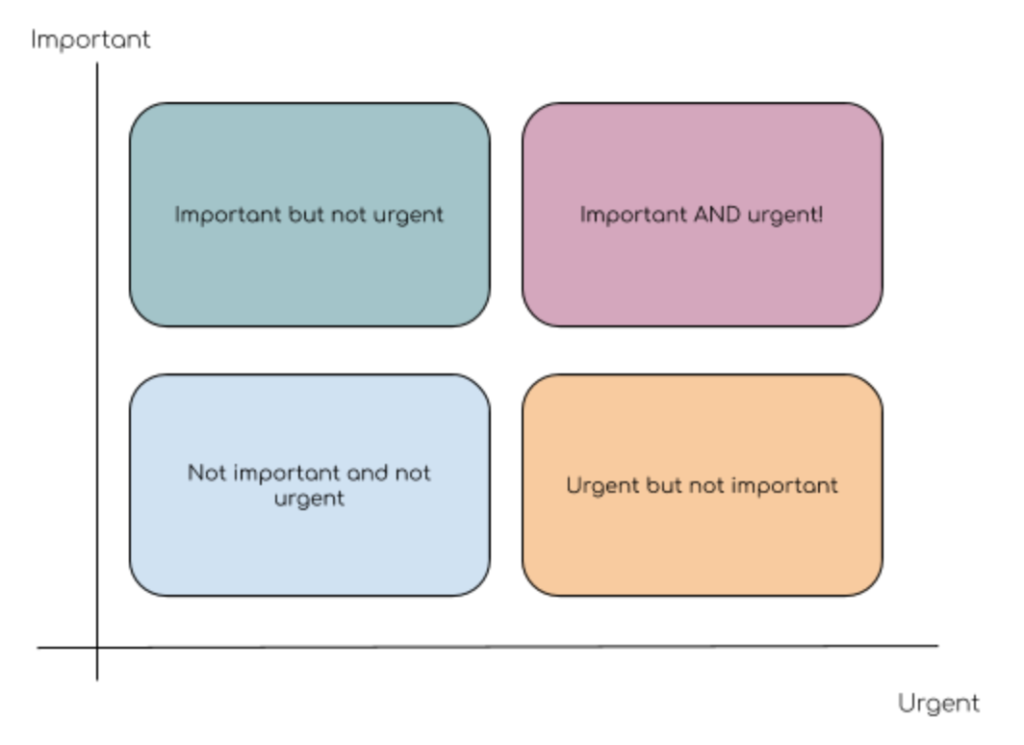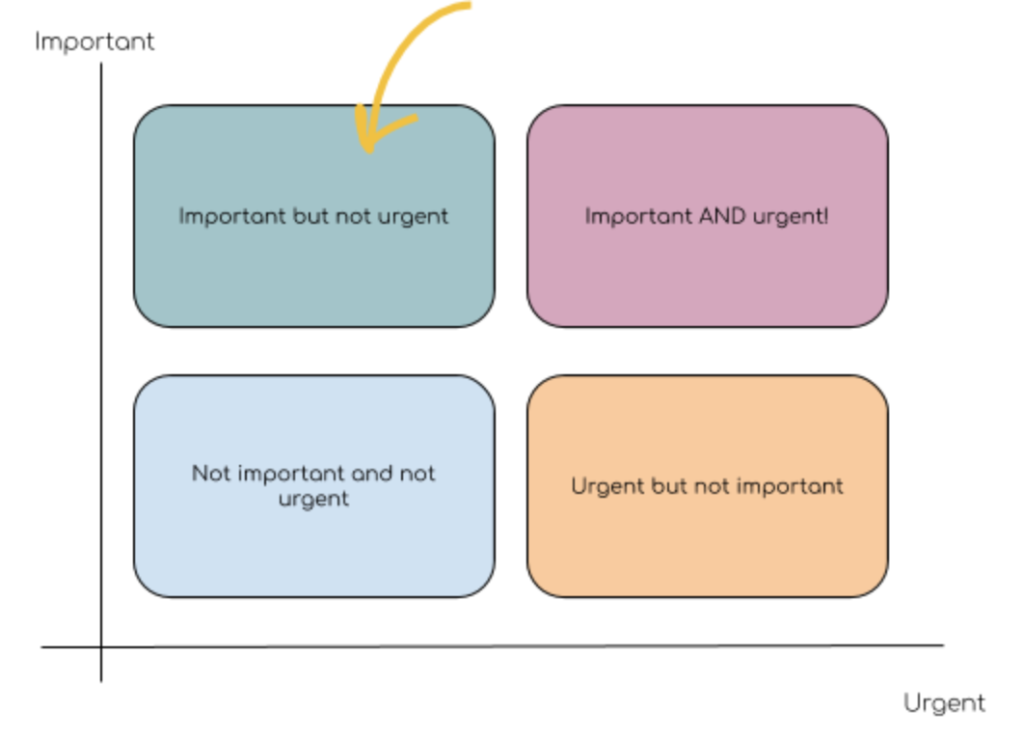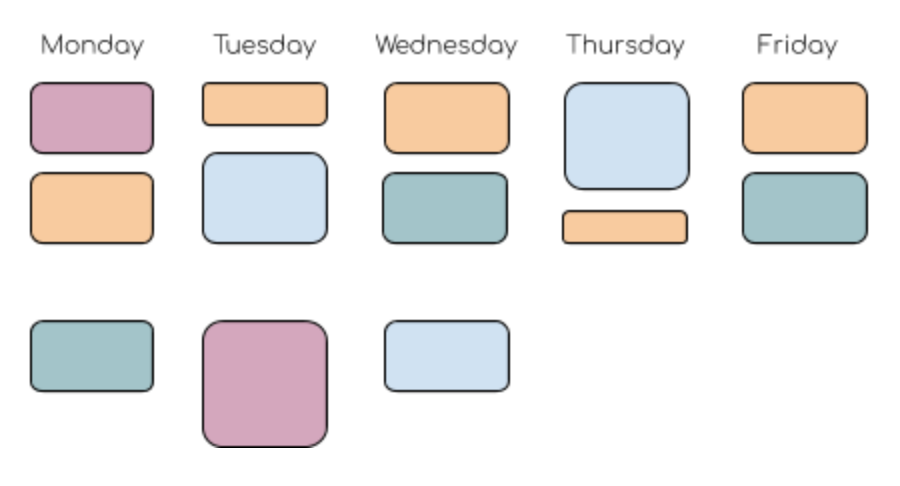It’s easy to struggle and get stuck in a stress wheel. There’s no denying it, we have all been there. but there are some things we can do to take leadership over our own time and master our weeks. Here are some simple actions to help you get over that hurdle and save energy for the weekend and your passions.
Time Management → Attention Management
Everyone has the same time. There is a saying that either you make time for what you need to do or you make up an excuse. It’s more Attention management than Time management.
Help yourself to not procrastinate. We all have our different procrastinations, might be productive procrastination like cleaning, we feel like we are productive but we are actually saving up for future stress.
ACTION -> Reflect on your most common procrastinations during a day. Take action to help yourself not to fall into procrastination. Put up notices or something to remind you to recover focus on the places that you usually fall into the lazy-trap, TV, fridge, coffee area etc.
Our phones are usually where we spill time, set up time notifications to remind you to go back to focus, turn off notices on all apps… You know what you need to do to help yourself.
Prioritize

The 80/20 rule plays out here. We tend to spend our time on the majority of tasks that have the least importance. We need to focus on the 20% of actions that actually matter and are the most critical to take us forward.
The best tips I have ever gotten was from my mentor Stuart Ross: Start every day with listing the 3 tasks that if you do them, will make you feel amazing.
And this can be anything, call your mum, go for a run, make an important decision. Whatever it is, make sure that you acknowledge yourself for when you’ve done them and allow yourself to feel amazing.
ACTION -> Do this now: List three things that will make you feel awesome if you get done today.
Empower yourself!
Our tasks
We can separate our tasks into 4 quadrants.
Important and urgent, Important and not urgent, urgent and not important and not important or urgent.

We normally tend to spend our time dealing with tasks in the important and urgent quadrant. Here we are reactive, putting out fires and then usually pendling down to the not important and not urgent quadrant, until the one that is important and urgent is full again.
ACTION -> Do an exercise where you fill in your tasks into the different quadrants and take a look at your tasks and reflect upon where You usually spend your time.
Be proactive

By not waiting for tasks to land in the top right corner, we take charge of our own time.
ACTION -> Go through the tasks in your upper left quadrant. If you spend time here, planning, preparing, reading up, you own your own time.
Be your own leader by planning your time and holding promises to yourself. This will not only make you feel good about yourself, it will also build your self esteem and give you energy to make better decisions, instead of easy decisions.
When you have your plan and you are following it, it’s time to trim your system so that you get the most out of your time.
Be in focus
There is an old lie going about that it is good to have many things going on. This couldn’t be more wrong. It takes time and energy to shift focus. If you are writing an email, take a pause to check out a pop-up on fb, answering a call, checking out a new email that just came in, talking to a colleague walking by… Every time you shift focus it takes time to refocus again.
If you want to get the most out of your time, start dining one thing at a time and complete the task you are on before beginning a new one. At a strat, this can be harder than it sounds. You will have to train yourself. Make it a habit to practice focus every day and reward yourself for taking the effort.
ACTION -> You need to help yourself by taking away the distractions that steal away your focus. Practical examples could be:
Turn of notices from emails and social media
Close windows or other programs on your screen that can steal your attention
Leaving your phone in another room
Put your phone on flight mode
Sit somewhere quiet and secluded
Sound canceling headphones
Music that help you focus
Politely tell your surroundings that you need to focus for a while
When you have completed the task you can reward yourself by being social and attentive again, and you will feel good about having finished your task.
Time thieves
Even though you work in focus and you are working proactively, you might still feel that you don’t get out as much as you would like from your workday.
ACTION -> Time to look for your time thieves, all the places where you feel that you wait or aren’t productive. Take a few minutes to reflect on your time thieves in a normal week and list them down.
Some examples might be:
- Waiting for people to answer when you call them
- Get stuck in your inbox
- Meetings that get rescheduled last minute
- Meetings that doesn’t lead anywhere
- Openings of meetings to get everyone updated on what it’s about
- …
If you reflect for 5 minutes you’ll certainly find some of your time thieves.
When we have found out where our time goes into the drain, we can start to address them and be proactive about them.
Go through your list and apply a solution oriented approach. How can you make these events either go away or at least prepare for them so that they don’t steal your precious time.
ACTION -> Deal with your time thieves.
Addressing the examples from above might be:
- Waiting for people to answer when you call them
- Send an email or sms to the person the day before informing them that you will call them at this time
- If you get the answer that they can’t talk right now, have a preplanned slot in your calendar where you plan to call people back, and say that “that’s alright, can I call you back ….” telling them your planned spot.
- Send an email or sms to the person the day before informing them that you will call them at this time
- Get stuck in your inbox
- Apply the Getting Things Done method → go through your inbox and if you can’t take action on an email in less than two minutes, make it a task in your task list and plan a slot when you go through your tasks later.
- Meetings that get rescheduled last minute
- Perfect time to go through your task list from your inbox
- Meetings that doesn’t lead anywhere
- Always make sure to create an agenda and clear goals with the meeting
- Openings of meetings to get everyone updated on what it’s about
- Send out the agenda, the purpose of the meeting and additional information in the invite and politely beg the participants to read into the material and point out that you expect everyone to be prepared
- And so on…
ACTION -> Make rules for yourself and start setting standards for your coworkers.
Be a role model for the culture you want others to follow.
Plan your perfect week
Open your calendar and create a perfect week.
If there were no limitations, how would you love your week to be?
ACTION -> Sketch out the different time slots at the position you’d love to have them. Make sure to plan in time for yourself and rest.

When you’ve made your sketch print it and keep it close to your workplace or project the time slots forward in your calendar system so you always get help from yourself to stay in your preferred system. Strive to book all incoming activities in the slots where you would have put them in your perfect week.
Reality might not live up to your dreams right away, but the more practice you have in this, the closer it will be. See it as honouring yourself and reward yourself when you have stuck to your own system.
The power in saying no
It all comes down to taking responsibility for your own energy and what you want to do with it. You need to make sure that you use it sustainably and a factor in that you need to have energy left for your free time.
ACTION -> If you feel in your stomach that you might have to apologize for not having been able to accomplish a task you’re asked to do, be proud of yourself and SAY NO.
You can do yourself, your colleague and your customer no greater service.
This also goes for keeping all promises, to yourself as well as to colleagues and customers.
Be your own leader.
To your success!
Isabel Azcárate
Are you interested in learning how to start an online business, like I have?
Sign up here and I’ll send you a free workshop series to help you get started.

